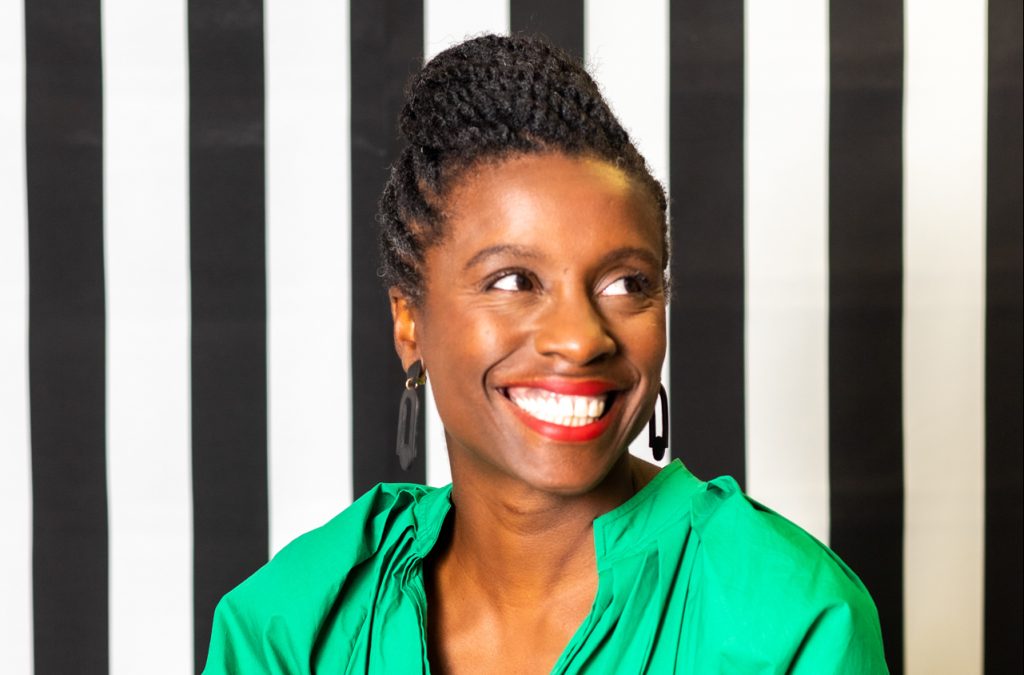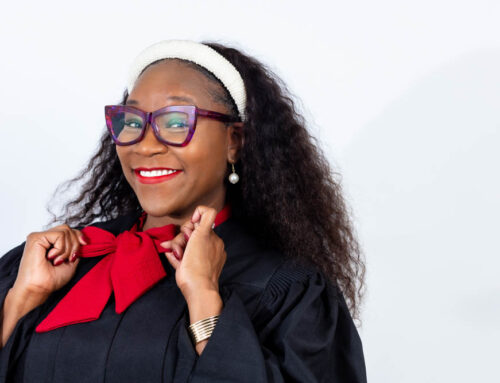Construction on a deck across Interstate 35, reconnecting neighborhoods east and west of the highway, could be completed by the end of this year.
This deck will be a blank slate, and it is up to the Southern Gateway Public Green Foundation to make a park happen. The group has raised more than $62 million, about 75% of the funds needed to plan and build phase one of a park over the interstate.
And they’ve spent over a year engaging with surrounding communities and drawing up an equitable development plan, released last year.
Construction on the first half of the park is expected to begin in January 2023, and it could be finished by summer 2024.
Phase two, which will expand the deck farther south, is still unfunded.
Oak Cliff resident April Allen is president and chief operating officer of the foundation.
A native of Toronto, Allen has a bachelor’s degree in mechanical engineering. She lived in Atlanta, New York and Boston before earning an MBA from Harvard University and arriving in Dallas to work as a women’s couture buyer at Neiman Marcus.
“I had a five-year plan for Dallas,” she says.
But then she married Oak Cliff native Sean Allen, had two kids, now 8 and 6, and settled in the Kidd Springs Park area.
During her “parenting sabbatical,” she became more involved in the community and joined the boards of several nonprofits. That’s how her involvement with the deck-park project began. A couple of years after joining the board, she was asked to lead the organization.
Why this big Dallas project is different
It’s exciting to have so many people in our community invested in the success of southern Dallas and our city as a whole. It’s easy to be somewhat cynical about the big projects in our city because so many of them have been someone else’s big idea for our city. But ours is one that has been led by grassroots and driven by community members.
The foundation’s equitable development plan
Early on, the board wanted to center the project in equity. We made sure neighbors had a seat at the table in the design process. Not just in the design of the park, but also in the programming. How can we improve the lives of people who live around the park? How can we be intentional about using this park to improve the community around it? The exhaustive process for community input in design and programming yields a project and park that is for the community, by the community.
What’s next for that plan
We created a community advisory council that will live beyond the equity project. It’s co-led by (former City Council member) Delia Jasso and Libbie Lee of the Golden S.E.E.D.S. Foundation in the Bottom. There’s a pedestrian walkway — we call it the 12th Street promenade — and we want to use it as a history walk, lifting up the stories of people who have made an impact on Oak Cliff, or people from Oak Cliff who’ve had an impact on the world.
The foundation’s goals for this year
We’re turning that equitable development plan into action with our financial literacy series. Our big goal is to finish raising money. We were at the 75% mark to build first phase. Our goal is to have identified those funds by the end of the year because we want to start construction on amenities at the beginning of next year.
What her day-to-day is like
There’s no day that’s typical. Last night we had an event at the Perot companies to share our stories with potential supporters. This morning, I hosted a site tour at the park. That was followed by a meeting at the zoo to talk about partnership opportunities with them. This afternoon, I met with the campaign committee for strategizing. Now I’m doing a media interview with you. Then after this, I have another visit with our colleagues at the City of Dallas. We’re in constant contact with stakeholders in the public sector. I love it. Obviously, it’s very important to me. I live here; I’m raising my family here. My entire team lives in Oak Cliff.
The aspect of the park she finds most exciting
It’s going to be a fantastic place to bring our community together. I would love to see the Taste of Oak Cliff there, or it being an end point for the Cinco de Mayo parade. The programming that we’re going to offer, all those things are not readily available on our side of town. Yes, there will be movie nights and yoga, but also being really thoughtful about how we can use the park to be truly a gateway for our community is exciting for me.
Common misconceptions about the deck park
I come across people who are like, “Oh, is that actually happening?” Yes! It’s under construction. If you’ve driven on I-35 lately, you’ve driven under the deck park bridge. They’re making fast work of it.
What she wants people to know about the foundation
Rest assured, this is community-led. Our entire team lives in Oak Cliff. This is our neighborhood. We’re raising our families here. We want this to be a success for the community, and we want to do right by the project.
Interview has been edited for clarity and brevity.
What’s in the plan?
6 tenets of the Southern Gateway Public Green Foundation’s equitable development plan
History and culture
“Community members expressed a desire to learn and share a comprehensive history of Oak Cliff, including its Indigenous and European settlements, establishment of a Freedmen’s Town, Lake Cliff Amusement Park, the original impact of I-35 and highlights of historical community leaders and entertainers.”
Health and wellness
The plan calls for programming such as farmers markets, which can add fresh-food options for neighborhoods that lack grocery stores, as well as space for mobile health screenings.
Educational opportunities
“These opportunities could include sharing the history of Oak Cliff, teaching residents how to garden, hosting a mini-library or book exchange, and offering free Wi-FI to help bridge the existing digital divide.” An outdoor classroom, a neighborhood library and business networking opportunities are among the suggestions.
Economic development
“Community members have a clear desire for the park to be economically accessible to existing businesses and residents and to serve as a vehicle for upward economic mobility for the community as a whole.” Suggestions include business readiness programming, prioritizing locally owned businesses for opportunities in the park, a business incubator program and accessible pricing requirements, so that neighborhood residents aren’t priced out of amenities or pop-ups.
Diverse housing options
“While the park is not a housing developer, it realizes the importance of the park’s potential impact on the nearby housing market and its ability to advocate for community-first housing policies.” The plan suggests hosting title-clearing clinics, a community land trust, home-improvement programs and rent-stabilization plans.
Safe and stable neighborhoods
The foundation can partner with organizations to provide resources, such as comprehensive social services, neighborhood safety measures, well-maintained infrastructure, public education and art and cooperative ownership.






